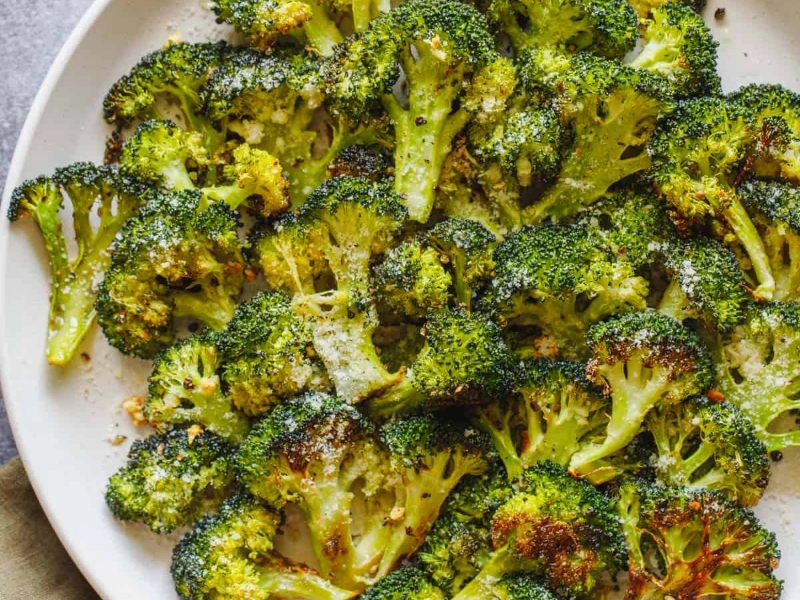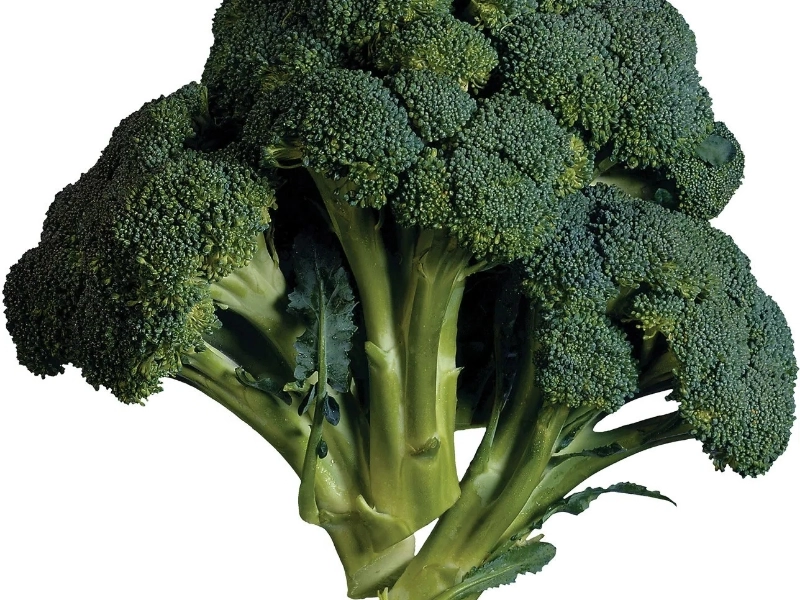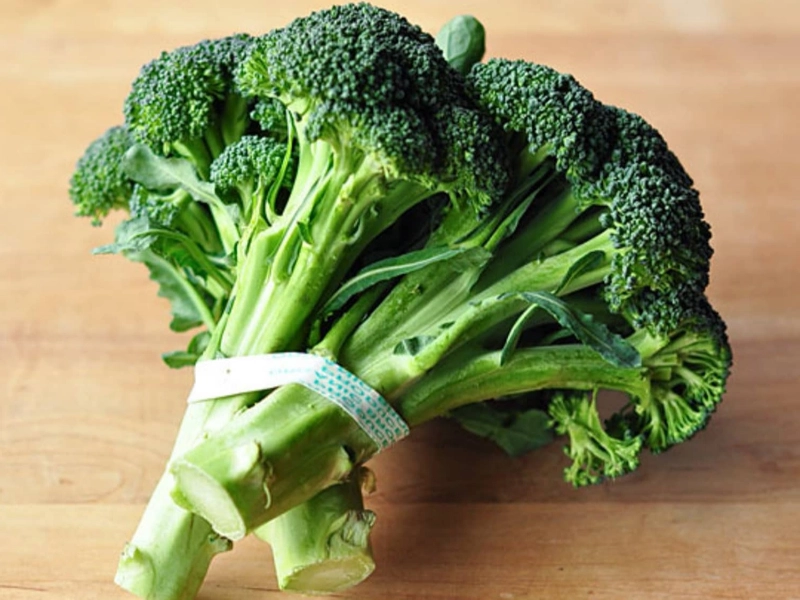A food high in vitamins, minerals, fibre, and antioxidants, broccoli is nutrient-dense. Since it belongs to the cruciferous family of vegetables, which also includes kale, cabbage, cauliflower, and Brussels sprouts, it has folate to support healthy cell growth and development as well as vitamins C and K for a strong immune system. Consuming broccoli on a daily basis, especially raw, improves dental health and brightness. This vegetable contains a wealth of natural minerals that aid in preventing gum disease and dissolving plaque accumulation.

 Broccoli is a superfood that strengthens your teeth and gums, but other fruits and vegetables are beneficial to your oral health. It has high levels of iron and calcium, which work together to create an imperceptible barrier against tooth decay. Additionally, the leafy greens encourage the production of saliva, which can wash away bacteria and food particles.
The Brassica family, which also contains kale, Brussels sprouts, cauliflower, and cabbage, includes broccoli. This plant contains glucoraphanin, which, when broken down, becomes sulforaphane. This special molecule is believed to provide multiple health benefits, such as avoiding osteoarthritis and heart disease, regulating blood sugar, and potentially even fighting cancer.
More than twice as much vitamin C (81 milligrammes) as an orange may be found in one cup of broccoli. Strong antioxidants like vitamin C strengthen the immune system and fend off a host of diseases. It is also known to lessen signs of ageing such as wrinkles, guard against oxidative stress, and avoid eye issues.
Broccoli is a superfood that strengthens your teeth and gums, but other fruits and vegetables are beneficial to your oral health. It has high levels of iron and calcium, which work together to create an imperceptible barrier against tooth decay. Additionally, the leafy greens encourage the production of saliva, which can wash away bacteria and food particles.
The Brassica family, which also contains kale, Brussels sprouts, cauliflower, and cabbage, includes broccoli. This plant contains glucoraphanin, which, when broken down, becomes sulforaphane. This special molecule is believed to provide multiple health benefits, such as avoiding osteoarthritis and heart disease, regulating blood sugar, and potentially even fighting cancer.
More than twice as much vitamin C (81 milligrammes) as an orange may be found in one cup of broccoli. Strong antioxidants like vitamin C strengthen the immune system and fend off a host of diseases. It is also known to lessen signs of ageing such as wrinkles, guard against oxidative stress, and avoid eye issues.
 Studies have indicated that consuming cruciferous vegetables, like broccoli, can aid in the defence against oral bacteria. Sulforaphane, indole-3-carbinol, isothiocyanates, and other glucosinolates have antibacterial qualities because they prevent the formation of pathogenic germs. It is also one of the richest sources of kaempferol, an antioxidant that may guard against cancer, heart disease, and inflammation; vitamin A, which helps prevent periodontal disorders; and vitamin C, which lowers inflammation and increases tissue strength (5).
Broccoli also contains minerals including potassium and iron, as well as the cell-protecting vitamins A, E, and K. It also has a high amount of calcium (approximately half that of a cup of cottage cheese). Select organic broccoli since it is lower in pesticide contamination and has more phytochemicals.
Chew your broccoli well to help wash out food particles and increase saliva production. Additionally, keep in mind that boiling or overcooking it will reduce the amount of nutrients in the vegetable.
Studies have indicated that consuming cruciferous vegetables, like broccoli, can aid in the defence against oral bacteria. Sulforaphane, indole-3-carbinol, isothiocyanates, and other glucosinolates have antibacterial qualities because they prevent the formation of pathogenic germs. It is also one of the richest sources of kaempferol, an antioxidant that may guard against cancer, heart disease, and inflammation; vitamin A, which helps prevent periodontal disorders; and vitamin C, which lowers inflammation and increases tissue strength (5).
Broccoli also contains minerals including potassium and iron, as well as the cell-protecting vitamins A, E, and K. It also has a high amount of calcium (approximately half that of a cup of cottage cheese). Select organic broccoli since it is lower in pesticide contamination and has more phytochemicals.
Chew your broccoli well to help wash out food particles and increase saliva production. Additionally, keep in mind that boiling or overcooking it will reduce the amount of nutrients in the vegetable.
 An accumulation of bacteria that produce odours and break down proteins in the mouth is what causes bad breath. Eating foods strong in sulphur compounds, such as onions and garlic, or foods high in carbs, such as starches and sugars, may make this worse.
Because broccoli includes natural plant compounds like sulforaphane and isothiocyanates that make the mouth's microorganisms unfriendly, eating broccoli can help prevent foul breath. These substances also promote salivation and function as natural disinfectants, eliminating bacteria that cause bad odours.
In addition to being a good source of vitamin C—one cup contains as much of it as an orange—broccoli is also high in potassium, calcium, folate (vitamin B9), and other nutrients. It also has a high fibre content, which helps to release food particles stuck in the gums and increases salivation. To get the most out of broccoli, drink lots of water or yoghurt that has been fortified with probiotics before eating it.
An accumulation of bacteria that produce odours and break down proteins in the mouth is what causes bad breath. Eating foods strong in sulphur compounds, such as onions and garlic, or foods high in carbs, such as starches and sugars, may make this worse.
Because broccoli includes natural plant compounds like sulforaphane and isothiocyanates that make the mouth's microorganisms unfriendly, eating broccoli can help prevent foul breath. These substances also promote salivation and function as natural disinfectants, eliminating bacteria that cause bad odours.
In addition to being a good source of vitamin C—one cup contains as much of it as an orange—broccoli is also high in potassium, calcium, folate (vitamin B9), and other nutrients. It also has a high fibre content, which helps to release food particles stuck in the gums and increases salivation. To get the most out of broccoli, drink lots of water or yoghurt that has been fortified with probiotics before eating it.